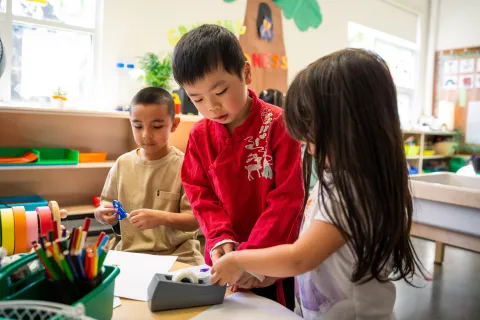
The early years of every child’s life are crucial for social, emotional, and cognitive development. Joyful, high-quality preschool and early learning programs are one of the most effective ways to positively impact brain development, school readiness, and overall family well-being. Affordable preschool and child care also enable parents to work. This two-generation approach supports families’ needs and supports improved economic, educational, health and other holistic outcomes.
Preschool not only improves health, educational, economic, and social outcomes for individual children and their families, but it also provides a high rate of return on the public’s investment: for every dollar spent on high-quality preschool, the community sees a return of between $7 and $12 (Heckman, Pinto, Shaikh, 2024). Investments in early childhood education programs reach far beyond individuals and families, saving money on costly interventions later in life and opening pathways to economic prosperity.
Brain Development and Long-term Impacts of Preschool
- The Long-Term Effects of Universal Preschool in Boston
- Does High-Quality Preschool Benefit Children? What the Research Shows
- The Perry Preschool Study
- Abecedarian Project
- The Effects Of Early Care And Education On Children’s Health | Health Affairs
- Center on the Developing Child at Harvard
The Importance of Play-Based Learning
Economic Impacts of Preschool
- The Case For Universal Pre-K Just Got Stronger : Planet Money : NPR
- Why equitable access to quality child care matters to the economy - Fed Communities
- The benefits and costs of investing in early childhood education - Equitable Growth
- The rate of return to the HighScope Perry Preschool Program - ScienceDirect
Additional Resources
Below are some researchers and blogs that we look to as we continue to learn about the impacts of early childhood education in the past, present, and future.
Center on the Developing Child - Harvard University
Center for the Study of Child Care Employment - UC Berkeley
Center for Research on Children in the United States (CROCUS) - Georgetown University
Early Childhood Longitudinal Studies (ECLS) Program - National Center for Education Statistics
Early Childhood Resources from the Annie E. Casey Foundation
Early Childhood Resources from the Center for American Progress
